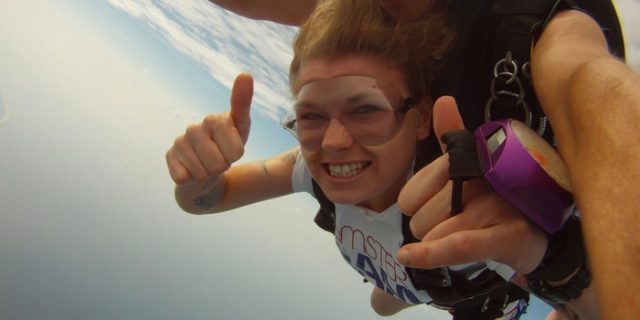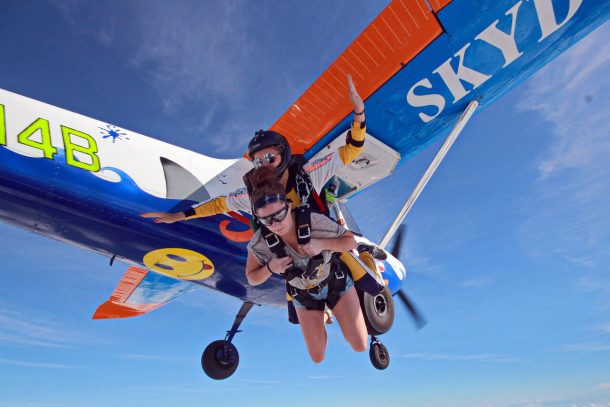How Dangerous Is Tandem Skydiving?
Skydiving Information
Posted by: SCC ADMIN
8 years ago

Since skydiving is so popular and accessible, asking about its safety is very fair. Considering how often we get asked the question, “how dangerous is tandem skydiving”, it’s clear that we should directly address this issue–and, ultimately, give hopeful jumpers a few insights about the risks and statistics involved.
If you’re thinking about venturing down to the dropzone for your very first skydive, you’re certainly not alone. Every year, millions of people grapple with their most feral tummy butterflies to experience skydiving for the very first time.
Most of these first-time jumps are done as “tandems”. Tandem skydives pair a professional skydiver with a newbie, using a large parachute–operated by the experienced instructor–to guide them both safely to the ground. Since tandem parachutes were invented, they’ve allowed curious folks to experience the majesty of a skydive without having to invest right away in a learn to skydive program.
1. SKYDIVING STATS
First, meet the USPA: the United States Parachute Association. The USPA is the United States’ oversight body for the skydiving sport. The USPA oversees safety regulations for its member dropzones and regulates professional skydiver training, as well as recording and tracking statistics relating to safety.
USPA collects its numbers comprehensively, because it’s only by knowing what’s going on that it can truly manage skydiver safety. Their discovery? Well: only 0.003 student fatalities have occurred per 1,000 tandem jumps over the past decade, making tandem skydiving safer than our morning commute. Today, tandem skydiving is safer than it has ever been–and millions of happy jumpers have found this risk entirely acceptable. Just like anything else, though, there’s no 100% guarantee of safety: tandem skydiving still presents a risk, but a great skydiving operation actively minimizes that risk by every possible method.
2. A LITTLE ABOUT YOUR INTREPID INSTRUCTOR
In order to get the certification to work as a tandem skydiving instructor, a skydiver must already be a professional-level jumper, fulfilling a number of rigorous prerequisites before they can even enroll. A TI candidate must demonstrate at least three years of skydiving experience, have 500 signed-off jumps in their logbook and prove good health. Some dropzones require even more than that before allowing a tandem instructor to work at their dropzone. At Skydive Coastal Carolinas, we’re proud to announce that most of our skydiving instructors have several thousands of jumps and plenty of years of skydiving experience.
3. A LITTLE ABOUT YOUR RIDE
Y’know what’s amazing? Skydiving equipment.
The technology behind the gear we jump has improved exponentially with time, introducing scores of new innovations, and astronomical safety improvements. The skydiving industry employs some of the smartest people you’ll ever meet–who bring math, science and fun together in a way that seriously makes our world go ’round.
When you huck out of the plane on a tandem skydive, you’re jumping with not one but two parachutes: a main’ and a ‘reserve.’ If one of those super-rare contingencies comes up with your main parachute, your instructor immediately releases it and deploys the spare. And get this: when there’s a cutaway situation, most tandem students don’t even notice when it happens.
That reserve parachute is treated with consummate care. The FAA requires that it is inspected and repacked every 180 days–whether used or not. In addition to all that, all of Skydive Coastal Carolinas’ tandem rigs are additionally outfitted with an automatic activation device (or “AAD”). This little gizmo is a computer that uses measured descent rate and altitude to deploy that reserve parachute at a safe altitude no matter what, without any human input. Doesn’t that feel good to know?
Making sure you have the world’s best skydiving experience begins with answering all of your questions, honestly and completely. Please feel free to contact us with your questions! We’d be more than happy to answer them.





